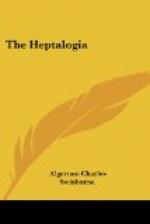VI
In the darkness (right Dickens) of Tom-All-Alone’s
Or the Morgue out in Paris, where tragedy
centuples
Life’s effects by Death’s algebra, Shakespeare
(Malone’s)
Might have said sleep was murdered—new
scholiasts have sent you pills
To purge text of him! Bread? give me—Scottice—scones!
VII
Think, what use, when youth’s saddle galls bay’s
back or roan’s,
To seek chords on love’s keys to
strike, other than his chords?
There’s an error joy winks at and grief half
condones,
Or life’s counterpoint grates the
C major of discords—
’Tis man’s choice ’twixt sluts rose-crowned
and queens age dethrones.
VIII
I for instance might groan as a bag-pipe groans,
Give the flesh of my heart for sharp sorrows
to flagellate,
Grief might grind my cheeks down, age make sticks
of my bones,
(Though a queen drowned in tears must
be worth more than Madge elate)[1]
Rose might turn burdock, and pine-apples cones;
IX
My skin might change to a pitiful crone’s,
My lips to a lizard’s, my hair to
weed,
My features, in fact, to a series of loans;
Thus much is conceded; now, you, concede
You would hardly salute me by choice, John Jones?
[Footnote 1: First edition:— And my face bear his brand—mine, that once bore Love’s badge elate!]
* * * * *
THE POET AND THE WOODLOUSE
Said a poet to a woodlouse—“Thou
art certainly my brother;
I discern in thee the markings of the
fingers of the Whole;
And I recognize, in spite of all the terrene smut
and smother,
In the colours shaded off thee, the suggestions
of a soul.
“Yea,” the poet said, “I smell thee
by some passive divination,
I am satisfied with insight of the measure
of thine house;
What had happened I conjecture, in a blank and rhythmic
passion,
Had the aeons thought of making thee a
man, and me a louse.
“The broad lives of upper planets, their absorption
and digestion,
Food and famine, health and sickness,
I can scrutinize and test;
Through a shiver of the senses comes a resonance of
question,
And by proof of balanced answer I decide
that I am best.”
“Man, the fleshly marvel, alway feels a certain
kind of awe stick
To the skirts of contemplation, cramped
with nympholeptic weight:
Feels his faint sense charred and branded by the touch
of solar caustic,
On the forehead of his spirit feels the
footprint of a Fate.”
“Notwithstanding which, O poet,” spake
the woodlouse, very blandly,
“I am likewise the created,—I
the equipoise of thee;
I the particle, the atom, I behold on either hand
lie
The inane of measured ages that were embryos
of me.




